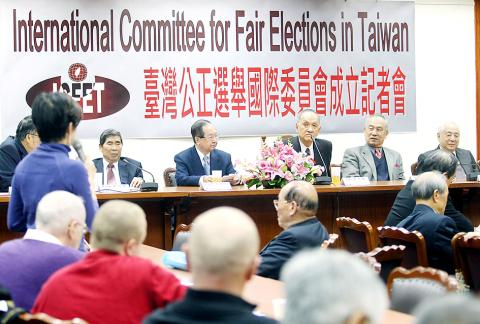More than 80 international and domestic politicians, academics and democracy advocates launched a coalition yesterday calling for free and fair elections and a peaceful transition of power.
The International Committee for Fair Elections in Taiwan (ICFET) announced its formal establishment in Taipei 30 days before the Jan. 14 presidential and legislative elections.
“We have only one sincere but strong demand — that the Jan. 14 elections should be conducted fairly and properly, as fair elections are the minimum requirement for a democratic society and the polls come as a great challenge for Taiwan,” said former presidential adviser Peng Ming-min (彭明敏), chairman of the organization.

Photo: CNA
Among the international members are 12 members of the Japanese Diet, five members of the European Parliament, civil society leaders from all continents and experts on Taiwan and Asian affairs, as well as a distinguished group of Taiwanese elder statesmen.
The committee will be closely monitoring election developments and would expose anything inappropriate and unfair, Peng said, adding that it would organize a program to observe the elections from Jan. 11 to Jan. 16, which would include visits to party headquarters, presidential campaign offices, election rallies and election briefings.
The committee called on all Taiwan’s political players to abide by the principles of a fair election and to refrain from violent behavior, while asking the international community to respect the political choices of the people of Taiwan.
On behalf of the international members of the committee, Stephane Corcuff, a professor at France’s University of Lyon, said while free elections had been the norm in Taiwan for decades, fairness and impartiality must be ensured.
“Freedom and justice should always go hand in hand in elections. Free and just elections serve everyone’s interests,” Corcuff said.
The committee intends to play an important role in the four-month transitional period between Jan. 14 and May 20, the longest transition period in the history of Taiwan’s elections, former deputy foreign minister Michael Kao (高英茂) said.
The committee had planned to invite former US president Jimmy Carter to act as an observer of the elections, but the plan failed to materialize because Carter insisted on a joint invitation by all three presidential candidates and President Ma Ying-jeou (馬英九), who is seeking re-election, refused to sign up, said Chai Trong-rong (蔡同榮), committee executive officer and a legislator of the Democratic Progressive Party.
Former president Lee Teng-hui (李登輝) serves as the committee’s honorary chairman, while Wu Li-pei (吳澧培), founding chairman of the Formosa Foundation, and Wu Rong-i (吳榮義), chairman of the Taiwan Brain Trust think tank, serve as vice chairmen.
Notable international members include Edward McMillan-Scott, who is vice president of the European Parliament, Graham Watson, who is president of the European Liberal Democrat and Reform Party and Nat Bellcchi, former chairman of the American Institute in Taipei, among others.

SECURITY: As China is ‘reshaping’ Hong Kong’s population, Taiwan must raise the eligibility threshold for applications from Hong Kongers, Chiu Chui-cheng said When Hong Kong and Macau citizens apply for residency in Taiwan, it would be under a new category that includes a “national security observation period,” Mainland Affairs Council (MAC) Minister Chiu Chui-cheng (邱垂正) said yesterday. President William Lai (賴清德) on March 13 announced 17 strategies to counter China’s aggression toward Taiwan, including incorporating national security considerations into the review process for residency applications from Hong Kong and Macau citizens. The situation in Hong Kong is constantly changing, Chiu said to media yesterday on the sidelines of the Taipei Technology Run hosted by the Taipei Neihu Technology Park Development Association. With

CARROT AND STICK: While unrelenting in its military threats, China attracted nearly 40,000 Taiwanese to over 400 business events last year Nearly 40,000 Taiwanese last year joined industry events in China, such as conferences and trade fairs, supported by the Chinese government, a study showed yesterday, as Beijing ramps up a charm offensive toward Taipei alongside military pressure. China has long taken a carrot-and-stick approach to Taiwan, threatening it with the prospect of military action while reaching out to those it believes are amenable to Beijing’s point of view. Taiwanese security officials are wary of what they see as Beijing’s influence campaigns to sway public opinion after Taipei and Beijing gradually resumed travel links halted by the COVID-19 pandemic, but the scale of

A US Marine Corps regiment equipped with Naval Strike Missiles (NSM) is set to participate in the upcoming Balikatan 25 exercise in the Luzon Strait, marking the system’s first-ever deployment in the Philippines. US and Philippine officials have separately confirmed that the Navy Marine Expeditionary Ship Interdiction System (NMESIS) — the mobile launch platform for the Naval Strike Missile — would take part in the joint exercise. The missiles are being deployed to “a strategic first island chain chokepoint” in the waters between Taiwan proper and the Philippines, US-based Naval News reported. “The Luzon Strait and Bashi Channel represent a critical access

Pope Francis is be laid to rest on Saturday after lying in state for three days in St Peter’s Basilica, where the faithful are expected to flock to pay their respects to history’s first Latin American pontiff. The cardinals met yesterday in the Vatican’s synod hall to chart the next steps before a conclave begins to choose Francis’ successor, as condolences poured in from around the world. According to current norms, the conclave must begin between May 5 and 10. The cardinals set the funeral for Saturday at 10am in St Peter’s Square, to be celebrated by the dean of the College